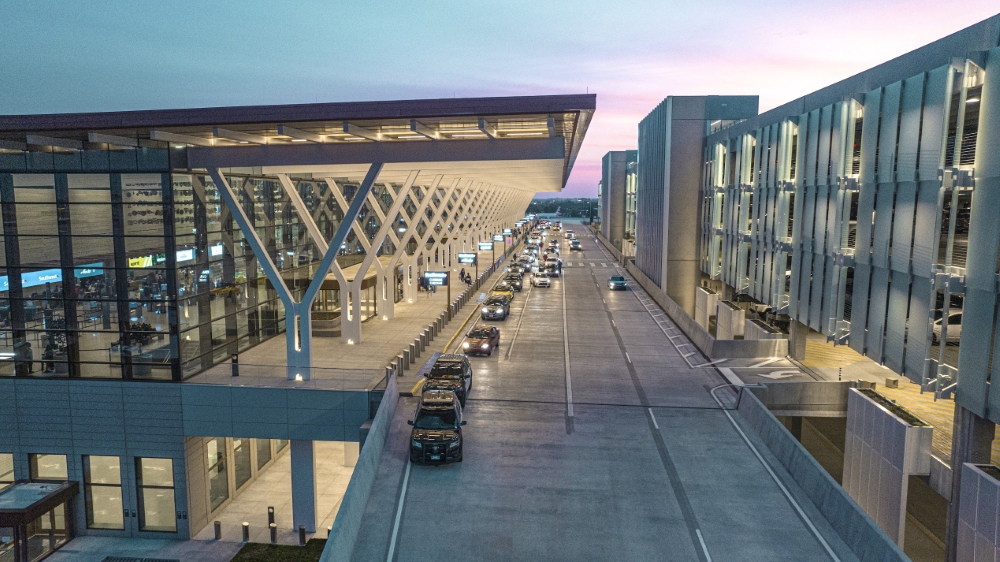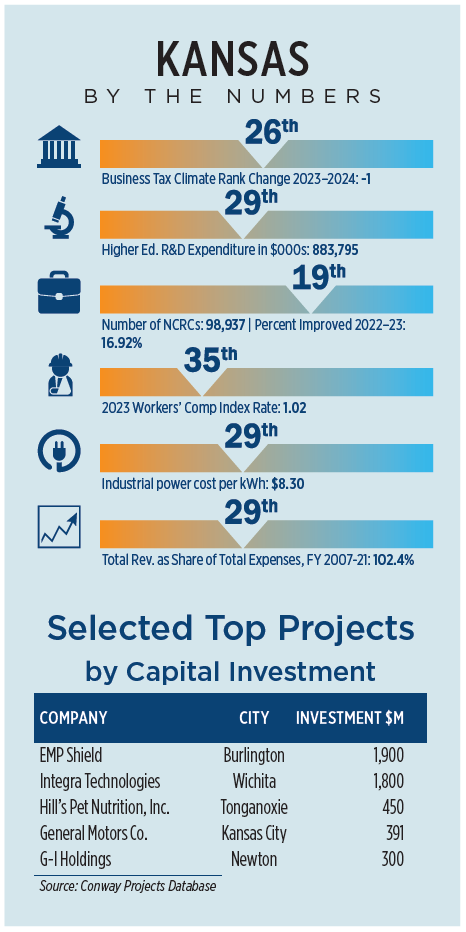Infrastructure buildouts are attracting big investments.
Kansas City likes to think of its newly renovated international airport (MCI) as a welcoming handshake to the world and a driver of renewed prosperity throughout the bi-state Kansas City region. Built at a cost of $1.5 billion — with an expansion from 32 gates to 40 and additional room to grow — it is the biggest infrastructure project in the Missouri city’s history.
Since its opening in early 2023, the sparkling new facility already is paying dividends, multiple public and private officials told Site Selection.
“It is the front door to the community,” says Kansas City Director of Aviation Melissa Cooper. “Both the new terminal and the airport are catalysts for economic development.”

Photo courtesy of Kansas City Aviation Department

Wait, hold on a second: Why are we talking about a Missouri airport in a story about Kansas? Because the integrated single terminal is a symbol of an integrated regional economy.
That integration also can be seen in the airport’s most recent annual report, where a demographic table shows fast-growing Johnson County’s population of nearly 620,000 helping the Kansas side account for more than 41% of the total metro area’s population of 2.2 million.
This new “front door,” Cooper tells Site Selection, makes a strong impression on those flying in. And well it should. An intricate sculpture that mimics the flow of water anchors the new space, made bright by floor-to-ceiling glass walls, high-level “clerestory” windows and skylights. Natural wood ceilings deliver a comforting, natural touch. The new layout includes multiple barbeque eateries and an in-house smoker among some 80,000 sq. ft. of retail and restaurants, both local and national. Meditation room? Check.
“Our team designed and built the terminal with the customer in mind, and the customer input we’re getting validates that effort,” says Cooper.
In the most recent North American Airport Satisfaction Study, MCI ranked number three in overall customer satisfaction.
“I do think it’s been a strong economic development tool,” says Daniel B. Jensen, Principal, Industrial Brokerage of Kessinger Hunter, Kansas City’s oldest commercial real estate firm. Like its region’s airport, the firm too is headquartered in Missouri but takes a keen interest in the state a stone’s throw away: The company’s national portfolio features 71 developed or managed properties on the Missouri side and 107 on the Kansas side.
Potential investors, Jensen believes, like what they see of the city’s new front door.
“The fact of the matter,” Jensen tells Site Selection, “is these folks that are looking at spending billions of dollars and they like flying into the new setting. A new, modern airport like ours says something about the community, that they can handle it. So, they can also handle projects and industry.”
Panasonic Is Proving to be a Boon
As the new terminal was nearing completion, Panasonic made worldwide news when it selected suburban Kansas City for a $4 billion lithium-ion battery manufacturing facility, the largest economic development project in Kansas history. The plant is bringing some 4,000 direct jobs to the region. It is expected to open next spring at the 9,000-acre Astra Enterprise Park in De Soto.
In March, Gov. Laura Kelly announced the biggest investment so far from what is expected to be a cluster of Panasonic suppliers. H&T Recharge, one of the world’s biggest battery component manufacturers, is investing $110 million and creating 180 jobs as Panasonic’s strategic supplier for cylindrical battery cans. Germany-based H&T is to co-locate with Panasonic on its 300-acre campus.
“We’re excited about the work being done to bring electric vehicle battery suppliers to our area,” said De Soto Mayor Rick Walker in a statement. “We’re looking forward to seeing more of this in the future.”
Kessinger Hunter has played a major role in bringing Astra Enterprise Park to fruition as a potential magnet for industrial investment. At 14 square miles, the park is larger than De Soto and even larger Kansas cities such as Emporia and Junction City. The massive project has required more than a decade of remediation, owing to its previous role as a World War II munitions plant.
“A new, modern airport like ours says something about the community, that they can handle it. So, they can also handle projects and industry”
— Daniel B. Jensen, Principal Industrial Brokerage, Kessinger Hunter
“It was ironic as heck,” observes Jensen, “that we’re standing out there at the ribbon cutting for Panasonic — a Japanese company that is bringing to fruition a wonderful new manufacturing facility in the modern era — at a site that used to make munitions that were being sent over to fight them.”
Logistics Industry Prospers
With four decades in commercial real estate in Kansas City, Jensen also has seen the cross-border region evolve into a consequential logistics hub. Time was, he recalls, that the Kansas City metro — despite an auspicious, central location — consistently lost out to Dallas and Chicago for big box warehouses serving the Midwest, due in large part, he says, to a lack of industrial product. That began to change, he says, after Kessinger Hunter took the plunge on a 40-acre spec project in 2007, whose success had the effect of drawing in national developers such as Northpoint and Van Trust.
“Kansas City,” he says, “used to be a pretty strong secondary distribution marketplace. This is my opinion, but it has since become a small, primary distribution marketplace. We have an industrial base of 350 million square feet that’s grown by about 60 million square feet in 15 years.”
In August, Kansas City’s 435 Logistics Center, a 400-acre industrial park in Kansas City, Kansas, developed by Indianapolis-based Scannell Properties, attracted a $27 million investment by toolmaker and supplier MARSHALLTOWN, which recently broke ground on a 200,000-sq.-ft. distribution center that’s expected to create 40 new jobs. MARSHALLTOWN COO Jack Murders tells Site Selection that the Kansas City location serves as a strategic midpoint between the company’s headquarters in Marshalltown, Iowa, and its manufacturing and distribution facilities in Fayetteville, Arkansas.
Beyond that, Murders cites personal relationships he established with officials at Scannell, and most importantly, he says, with Elli Bowen, vice president of business development for KC SmartPort, the economic development group for the logistics industry in the KC metro.
“Getting in touch with Elli,” Murders says, “was the single best thing that we did in this search. She made it happen as well as I’ve ever seen anybody execute an initiative. There are very few people I have enjoyed working with more. Elli is top notch.”

